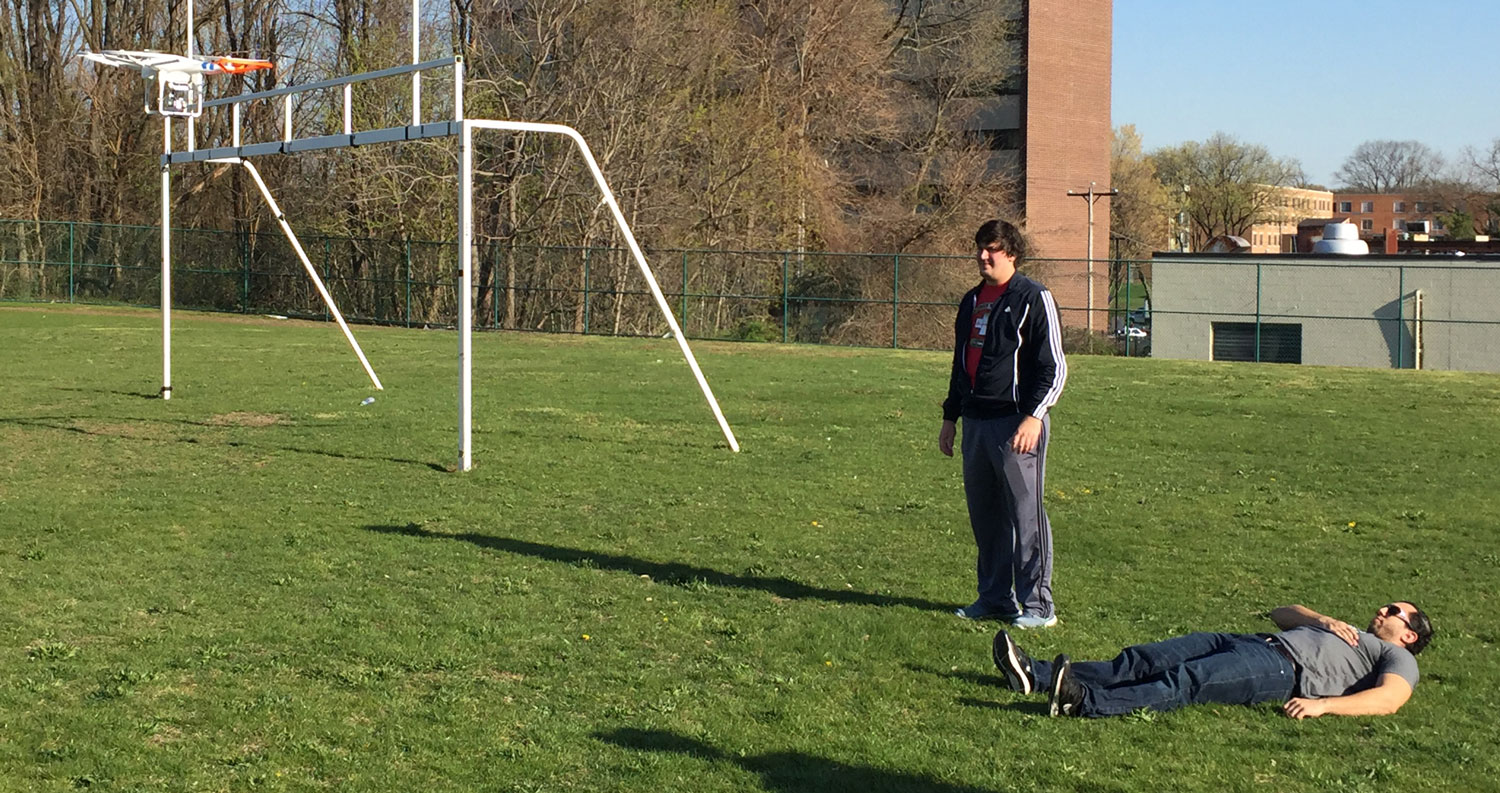Students Explore Drone As Potential Life-Saving Device
May 12, 2016
A group of medical students at PCOM are exploring the use of a drone, or unmanned
aerial vehicle (UAV), in emergency medical situations.
During a medical emergency such as a heart attack, time is of the essence; the quicker
emergency personnel can reach a person in distress, the better the outcome. However,
The National EMS Information System reports an average response time of more than
nine minutes.
To address this issue, a group of medical students at PCOM are exploring the use of
a drone, or unmanned aerial vehicle (UAV), in emergency medical situations to see
whether EMT response times could be shortened, and ultimately, patient outcomes could
be improved.
In the first stage of this multi-stage, multi-year project, the students staged a
mock-emergency site, using a heart-attack scenario, and outfitted a drone with a portable
electrocardiogram (ECG) device to test whether it could reach the site and successfully
take a reading when used by a layperson. The UAV flew 100 yards for about 2.5 minutes,
and once it reached its destination, the ECG provided an accurate reading, thanks
to a set of user instructions also included on the device. The students presented
their data at PCOM’s annual Research Day on May 11.
“At this initial stage, we've shown that our UAV was able to deliver an ECG in an
amount of time that would be significantly shorter than traditional delivery methods
such as an ambulance, particularly when traffic might be a hazard,” said MariaLisa
Itzoe (DO ’19) one of the project collaborators. “Our hope is that the UAV could be
used to gather information and transmit it back to the team who is en route, so that
they can be better prepared to effectively and appropriately treat the patient once
they arrive on site.”
 A group of students presented their data regarding the use of drones as potential
life-saving devices at PCOM's 6th annual Research Day. Photo credit: Jeffrey Baron (DO '18) and Kevin Kucharski (DO '18).
A group of students presented their data regarding the use of drones as potential
life-saving devices at PCOM's 6th annual Research Day. Photo credit: Jeffrey Baron (DO '18) and Kevin Kucharski (DO '18).
In addition to its use in medical research, Arthur Sesso, DO, professor and chair,
surgery, and the project’s faculty advisor, is interested in its use as a teaching
aid.
“Medical students learn better when they are engaged and involved, and that doesn’t
always happen in a lecture,” he said. “Students learn about cardiac events in their
first year, so this project is a way for them to learn those concepts in a more appealing
way.” Prior to using the drone, the students learned how to perform an ECG and used
that knowledge to write easy-to-follow instructions to accompany the drone. “It’s
important for the students to know how to communicate in plain language, because that’s
what they will need to do with their patients,” he said.
The group now comprises about 12 students with various areas of expertise, including
surgery, engineering and academic research. They plan to recruit new students each
year, and to test different sized equipment, longer flight distances, and additional
emergency scenarios (such as outfitting a drone with an epi-pen, in the event of an
allergic reaction).
“Ultimately, we hope that this technology can be applied to emergencies in rural and
urban settings, as well as within the military,” said Gary Clauss (DO ’18), another
collaborator.
PCOM’s annual Research Day is held to foster collaboration between researchers from across departments, and
build awareness of the College’s thriving areas of research. At this year’s event,
47 posters were submitted from the departments of Bio-Medical Sciences; Psychology;
Library and Educational Informational Services; and Academic Technologies; and from
several DO students and residents.
About Philadelphia College of Osteopathic Medicine
Established in 1899, Philadelphia College of Osteopathic Medicine (PCOM) has trained
thousands of highly competent, caring physicians, health practitioners and behavioral
scientists who practice a “whole person” approach to care—treating people, not just
symptoms. PCOM, a private, not-for-profit accredited institution of higher education,
operates three campuses (PCOM, PCOM Georgia and PCOM South Georgia) and offers doctoral degrees in clinical psychology, educational psychology, osteopathic
medicine, pharmacy, physical therapy, and school psychology. The college also offers
graduate degrees in applied behavior analysis, applied positive psychology, biomedical
sciences, forensic medicine, medical laboratory science, mental health counseling,
physician assistant studies, and school psychology. PCOM students learn the importance
of health promotion, research, education and service to the community. Through its
community-based Healthcare Centers, PCOM provides care to medically underserved populations.
For more information, visit pcom.edu or call 215-871-6100.
Contact Us
For general media inquiries, please contact the Office of Marketing and Communications
at 215-871-6300 or communications@pcom.edu. Visit our media relations page to view contact information for public relations personnel.
Connect with PCOM

 A group of students presented their data regarding the use of drones as potential
life-saving devices at PCOM's 6th annual Research Day. Photo credit:
A group of students presented their data regarding the use of drones as potential
life-saving devices at PCOM's 6th annual Research Day. Photo credit: 